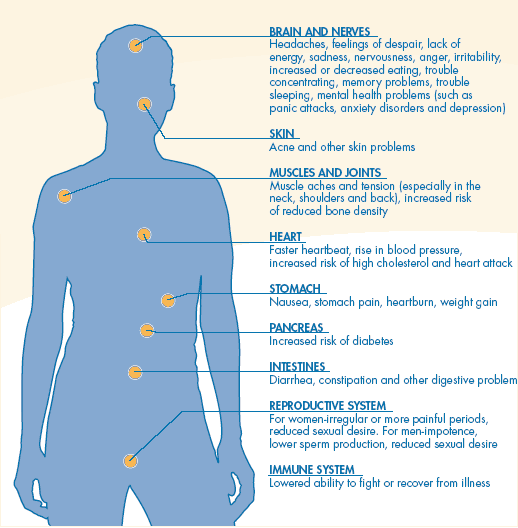You are here
How Stress Hurts
How Stress Hurts
Evolution was pretty savvy about danger. See a saber-tooth tiger, get moving! Today, flight—or fight, if necessary—still triggers major bodily changes, such as:
- Sugars in the bloodstream increase to supply energy
- Muscles tense so they're poised for action
- Heart beats faster to get blood pumping
- Digestion and other functions slow to save energy needed elsewhere
The problem is that our brains react to ominous loads of laundry and upcoming dentist visits like they were vicious predators. And the onslaught of today's stressors is fairly nonstop. When our bodies stay triggered for too long, lots of possible health problems can develop or worsen.
Stress may contribute to:
- high blood pressure
- heart disease and stroke
- decreased immune defenses
- cancer
- stomach problems
- poorer brain functioning
Stress also can lead to serious mental health problems, like depression and anxiety disorders.
Of course, you can't necessarily remove the sources of stress. But you can figure out ways to cope better with whatever comes your way. And decades of research suggest which steps are most likely to work.
Check out the 10 Tools to learn how to manage stress better and to Live Life Well.
Are You Too Stressed?
Your stress reaction can boost your performance and get you through a crisis. But too much stress can lead to serious problems.
If you're concerned about your well-being, take a look at the symptoms of stress overload:
- fatigue
- headaches
- loss of concentration
- difficulty making decisions
- inability to control anger
- increased use of alcohol, caffeine, cigarettes or drugs
- increased or decreased eating
- feeling overwhelmed
- thinking often about what you need to do
If you want to measure your stress, take our stress test.









this page